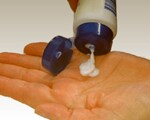Few facial skin creams that promise broad-spectrum sun protection actually measure up.

The vast majority of the products out there don't seem to provide adequate UV-A protection. Most of the creams don't contain the right combination of ingredients, and they don't contain the adequate concentration of ingredients.
Broad-spectrum UV coverage means the product shields users from UV-A and UV-B exposure, both of which contribute to premature skin ageing and skin cancer. The sun protection factor (SPF) printed on sunscreen containers refer to how well products protect against UV-B rays, which do not penetrate glass. Regulations to set UV-A ratings have been pending for years, and the lag is unfortunate, because protection from both sources of ultraviolet rays is crucial.
Many women apply an SPF-rated facial cream as their only sunscreen source, believing that if it says broad-spectrum they have complete protection. But those who spend most of their day indoors may be exposed to harmful UV-A rays that pass through office and car windows.
Dermatologists evaluated 29 top-selling daytime moisturisers claiming to provide broad-spectrum protection from the sun's ultraviolet rays in America. They compared the ingredients and the concentration of ingredients with their criteria for adequate UV-A protection. For effective coverage, they said products should contain a combination of more than 2 percent avobenzone and more than 3.6 percent octocrylene with or without ecamsule at 2 percent and/or zinc oxide at more than 5 percent. A concentration of 7 percent to 10 percent octocrylene is actually better. According to product labels, the SPFs of the creams studied ranged from 15 to 50.
It was found that only three or four passed their test and offered reliable protection from harmful UV-A rays. Six products, including the most expensive one, contained no active ingredients for shielding UV-A, the authors noted, pointing out that price is not an indicator of protection. Most of the creams did not contain the right combination of ingredients, or adequate concentration of ingredients.
Until tighter government regulations spell out what 'broad-spectrum' coverage actually means, the researchers emphasise that consumers who buy moisturisers should study product labels and look for the combination of ingredients outlined in this study.
DoctorNDTV is the one stop site for all your health needs providing the most credible health information, health news and tips with expert advice on healthy living, diet plans, informative videos etc. You can get the most relevant and accurate info you need about health problems like diabetes, cancer, pregnancy, HIV and AIDS, weight loss and many other lifestyle diseases. We have a panel of over 350 experts who help us develop content by giving their valuable inputs and bringing to us the latest in the world of healthcare.












